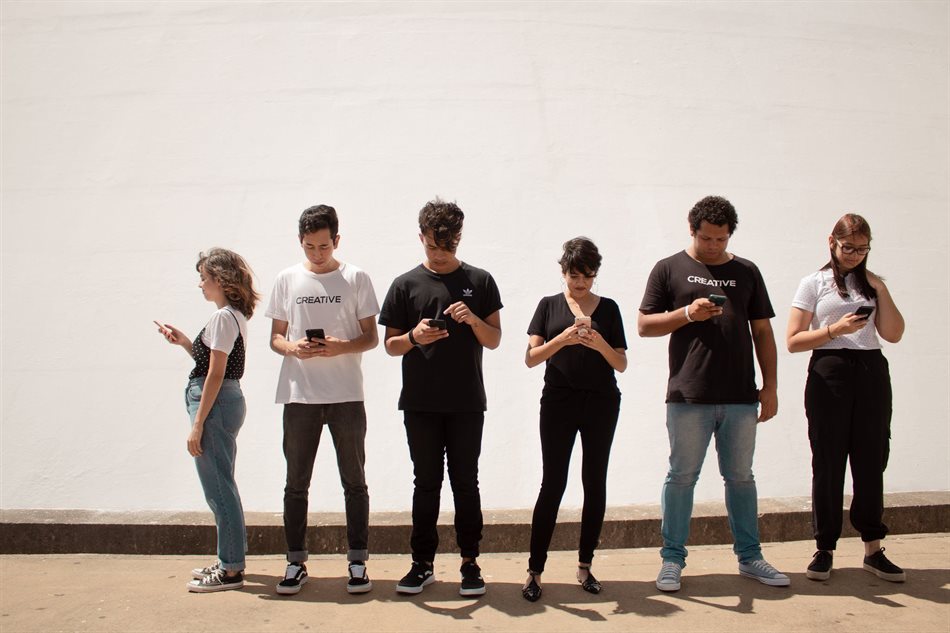
Photo by Creative Christians on Unsplash
Although a nostalgia inducing thought (and you may have the M-Net jingle playing in your head now), the youth of today simply don't do that anymore. They don't get together and debrief about episodes of their favourite shows the day after. Episodes rarely air one at a time on streaming services to begin with.
Young people also don't need to rush off to the shop once a month to get their hands on their favourite magazine. Gone are the days of innocently putting up a poster of Demi Moore on your bedroom wall or having Brad Pitt stuck to the inside of your space case with Prestik. Gen Zs know that if they want images (or anything for that matter), they can find them online. And fast. Consumption habits have changed tremendously, especially as new technologies have infiltrated modern life in a variety of different ways.
Youth MonthMediaHeads 360 18 Jun 2019
The rise of social media platforms
The rise of social media has been one of the biggest contributors to changes in youth media consumption habits. Facebook, Twitter, Instagram and Snapchat have shaken up the game, and young people who graduated high school after 2007 all experienced social media as an integral part of daily life during key formative years. All these years later, the world has moved on from using the platforms to solely giving updates about what they are doing (or eating), and these platforms are now fully integrated into the various consumption habits that form part of the digital age.
TikTok and music discovery
TikTok is undeniably the big youth platform of the moment. 5FM and Good Hope FM station manager JD Mostert recently referenced the platform in an interview while referring to the youth as the "drivers of content trends online". TikTok has gone through its own transformation in the five years since it was first released, evolving from a simple video content creation tool to becoming the biggest online platform for young people to discover and share music with each other.
Pop artist Marina learned this first hand earlier in 2021 when "Bubblegum B*tch" – an album track originally released back in 2012 – went viral through the platform out of nowhere. A few months later, the song has over 170 million streams on Spotify. Marina's former record company even went as far as to ask her to rush shoot a music video for the song to capitalise on its popularity (which she politely declined, citing that she had moved on from that time in her life). It probably also didn't help that she was promoting a string of feminist anthems at the time for a new album, which lyrically contrasts the more playful viral hit in quite the dramatic fashion.
This is one of many examples of how TikTok's disruption of the music industry is shaping pop culture. Because music is often a political statement, the youth market feel they can express themselves by using tracks they like in their videos and by sharing these online. If it can open up a dialogue for constructive social discussion in the process too, the world is all the more better off for it. WhatsApp movie nights
Youth media consumption of visual content has changed big time since the 90s and early 2000s. You may also be someone that has fond memories of calling to pre-book for the first screening of The Matrix Reloaded, and the excitement around seeing it with a group of friends while physically together at the cinema. Young people of today still consider watching movies together as a worthwhile social interaction, although they consume films in an entirely different way.
All it takes these days is a fibre internet connection and a basic video streaming subscription. Teens arrange a time to get together via WhatsApp group, and then watch 'together' at their own homes with their own snacks, while messaging each other all the way through. The most curious part about it is the human element of everyone pausing collectively when someone has to go to the bathroom. This shows that the goal is to enjoy a moment or experience together, similarly to how it would have been at a physical movie screening back in the day.
Understanding youth media consumption habits
These examples offer a gateway to understanding the consumption habits of the youth market of today. Simply put, they consume what they like, when they like and they do so on their own terms. It's important to also note that young people of today don't have much of a filter for non-authentic communication. If a brand gets it wrong, they move on to one of the many other options available and the drop off can be seen almost instantly. Shortened attention spans mean they have lower thresholds for patience and they get bored very quickly. This has to be kept in mind right from the early phases of any marketing campaign and is especially true in terms of audio or visual content shared as part of the rollout plan.
The power of inclusive content marketing
One thing is for sure: The youth market isn't interested in superficiality and can see right through brands that are trying too hard. More research is starting to show that they do respond well to inclusive marketing campaigns. These typically convey a common human value, and preferably one that is universally appropriate. Young people also want products and services that are easily accessible, that speak to their niche needs and are social (or cause) driven. These days, brands have a responsibility to take some sort of stance on societal issues and relevant causes. Sitting on the fence or being tone deaf can be walking a tightrope with a powerful market, and one that is quick to 'cancel' (even if to their own detriment at times).
A view towards the future
Bedroom posters and space case crushes may be a thing of the past, but media consumption is still held in high esteem as an important part of the daily lives of young people today. Although those 'simpler' days are long gone, brands now have access to ample sets of data and metrics to help them be as clear as possible about their messaging, and to measure the way youth audiences respond to it. If the message doesn't hit its mark with the target audience, pivoting is essential. Take as many lessons as possible on the chin, and remain flexible about the necessary changes to get closer to that bullseye the next time around.
It's hard to predict what things might look like 30 years from now (Dua Lipa comeback tour holograms streamed by our fridges?), but we're sure that the cycle will continue, and young people today will also look back on these years with a sense of nostalgia and a good sense of humour.
Perhaps a better title for this piece is the ever changing face of youth media consumption, after all.
About MediaHeads 360
MediaHeads 360 are level one BEE media specialists that develop and implement integrated, strategic marketing campaigns across diverse platforms. Our services are inspired by our 360° approach and include idea generation, production, implementation, campaign tracking, syndication, research, branded content, mobile broadcast, non-traditional television and radio campaigns, social media amplification activations and influencer marketing. In addition, we leverage our excellent relationships with media owners to negotiate with platforms across the country.
We activate by creating holistic, result-driven campaigns within the right environment. We captivate through well-implemented and engaging campaigns with multiple touch points. We amplify and optimise your reach and impact with 360° solutions.
For more information, visit www.mediaheads360.co.za

